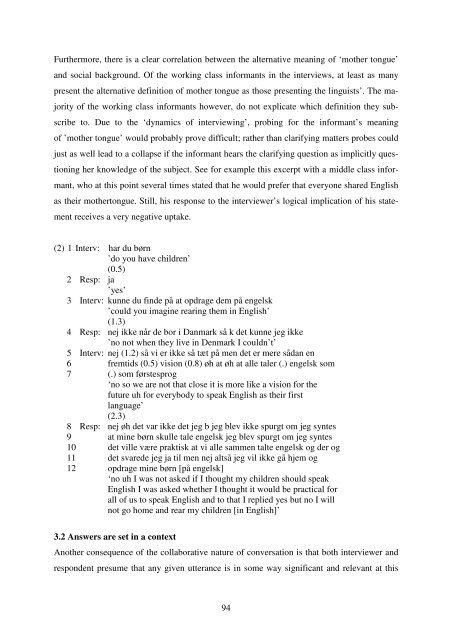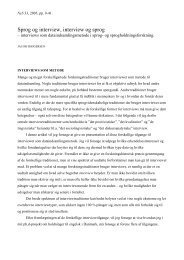Hør dog hvad de siger - Note-to-Self: Trials & Errors
Hør dog hvad de siger - Note-to-Self: Trials & Errors
Hør dog hvad de siger - Note-to-Self: Trials & Errors
Create successful ePaper yourself
Turn your PDF publications into a flip-book with our unique Google optimized e-Paper software.
Furthermore, there is a clear correlation between the alternative meaning of ‘mother <strong>to</strong>ngue’<br />
and social background. Of the working class informants in the interviews, at least as many<br />
present the alternative <strong>de</strong>finition of mother <strong>to</strong>ngue as those presenting the linguists’. The ma-<br />
jority of the working class informants however, do not explicate which <strong>de</strong>finition they sub-<br />
scribe <strong>to</strong>. Due <strong>to</strong> the ‘dynamics of interviewing’, probing for the informant’s meaning<br />
of ’mother <strong>to</strong>ngue’ would probably prove difficult; rather than clarifying matters probes could<br />
just as well lead <strong>to</strong> a collapse if the informant hears the clarifying question as implicitly ques-<br />
tioning her knowledge of the subject. See for example this excerpt with a middle class infor-<br />
mant, who at this point several times stated that he would prefer that everyone shared English<br />
as their mother<strong>to</strong>ngue. Still, his response <strong>to</strong> the interviewer’s logical implication of his state-<br />
ment receives a very negative uptake.<br />
(2) 1 Interv: har du børn<br />
’do you have children’<br />
(0.5)<br />
2 Resp: ja<br />
’yes’<br />
3 Interv: kunne du fin<strong>de</strong> på at opdrage <strong>de</strong>m på engelsk<br />
’could you imagine rearing them in English’<br />
(1.3)<br />
4 Resp: nej ikke når <strong>de</strong> bor i Danmark så k <strong>de</strong>t kunne jeg ikke<br />
’no not when they live in Denmark I couldn’t’<br />
5 Interv: nej (1.2) så vi er ikke så tæt på men <strong>de</strong>t er mere sådan en<br />
6 fremtids (0.5) vision (0.8) øh at øh at alle taler (.) engelsk som<br />
7 (.) som førstesprog<br />
‘no so we are not that close it is more like a vision for the<br />
future uh for everybody <strong>to</strong> speak English as their first<br />
language’<br />
(2.3)<br />
8 Resp: nej øh <strong>de</strong>t var ikke <strong>de</strong>t jeg b jeg blev ikke spurgt om jeg syntes<br />
9 at mine børn skulle tale engelsk jeg blev spurgt om jeg syntes<br />
10 <strong>de</strong>t ville være praktisk at vi alle sammen talte engelsk og <strong>de</strong>r og<br />
11 <strong>de</strong>t svare<strong>de</strong> jeg ja til men nej altså jeg vil ikke gå hjem og<br />
12 opdrage mine børn [på engelsk]<br />
‘no uh I was not asked if I thought my children should speak<br />
English I was asked whether I thought it would be practical for<br />
all of us <strong>to</strong> speak English and <strong>to</strong> that I replied yes but no I will<br />
not go home and rear my children [in English]’<br />
3.2 Answers are set in a context<br />
Another consequence of the collaborative nature of conversation is that both interviewer and<br />
respon<strong>de</strong>nt presume that any given utterance is in some way significant and relevant at this<br />
94



